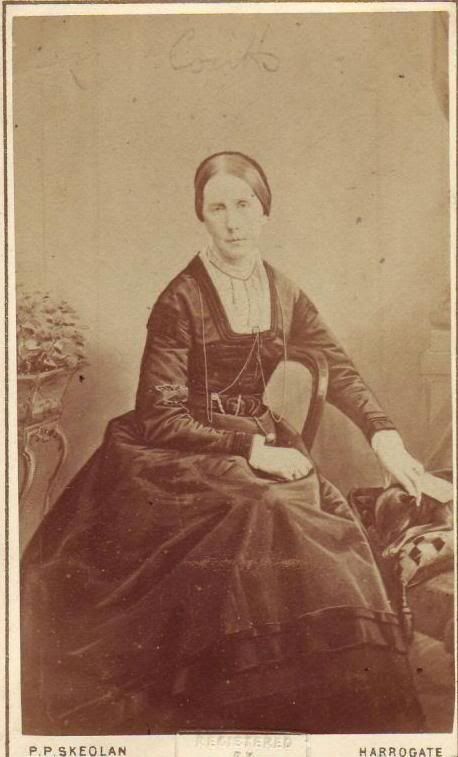1860's Angela Georgina Burdett-Coutts

1860's Carte de Visite Angela Georgina Burdett-Coutts
by Skeolan
Angela Georgina Burdett-Coutts, 1st Baroness Burdett-Coutts (24 April 1814-30 December 1906), born Angela Georgina Burdett, was the daughter of Sir Francis Burdett, 5th Baronet, an MP, and the former Sophia Coutts, who was the daughter of Thomas Coutts, the wealthy banker who founded Coutts & Co.
In 1837 she became the wealthiest woman in England when she inherited her grandfather's fortune of nearly two million pounds sterling via his wife Harriot Mellon, joining, by Royal License, the surnames of her father and grandfather to become Burdett-Coutts, and was widely known as "the richest heiress in England". She was a collector of significant paintings, and following the Westminster Hall competition of 1847, she purchased Robert Scott Lauder's Christ Walking on the Sea. The Reverend Richard Harris Barham, in a ballad he wrote under the pen name "Thomas Ingoldsby" for the Queen's coronation as part of the Ingoldsby Legends, referred to her as 'Miss Anjaley Coutts' and she became a notable subject of public curiosity, receiving numerous offers of marriage.
She also inherited the country house at The Holly Lodge in Highgate, which was then just outside London, where she was famous for throwing large parties. However, she spent the majority of her inherited wealth on scholarships, endowments, and a wide range of philanthropic causes. One of her earliest was to establish a home to help young women who had 'turned to a life of immorality' escape from prostitution.
Burdett-Coutts carefully avoided taking any side in party politics, but she was actively interested in phases of Imperial extension which were calculated to improve the condition of the black races, as in Africa, or the education and relief of the poor or suffering in any part of the world. Though she made no special distinction of creed in her charities, Burdett-Coutts was a notable benefactor of the Church of England, building and endowing churches and church schools, endowing the bishoprics of Cape Town and of Adelaide (1847), and founding the bishopric of British Columbia (1857).
She is also known for the erection of a granite fountain with a statue of Greyfriars Bobby[1].
Other projects included:
* President, British Beekeepers Association 1878 - 1906
* President of the Ladies Committee of the RSPCA (England/Scotland).
* the building of Anglican churches
* church bells for St Paul's cathedral
* cotton gins for Nigeria
* drinking fountains for dogs
* help for Turkish peasants and the refugees of the 1877 Russo-Turkish War, receiving the order of the Medjidieh, the only time it was conferred on a woman
* housing schemes for the working-class
* lifeboats in Brittany, France
* The Ragged Schools Union
* a sewing school for women in Spitalfields when the silk trade declined
* soup kitchens
* support organisations for the aboriginal peoples of Australia and for the Dayaks of Borneo
* The Temperance Society
* in Ireland she helped to promote the fishing industry by starting schools, and providing boats, also advancing £250,000 in 1880 for supplying seed to the impoverished tenants
* placement of hundreds of destitute boys in training-ships for the navy and merchant service
* financing the first archeological survey of Jerusalem in 1864 to improve its sanitation
She also established the National Society for the Prevention of Cruelty to Children (NSPCC) in 1883, the Westminster Technical Institute in 1893 and was closely involved with the Royal Society for the Prevention of Cruelty to Animals (RSPCA). Angela also founded Columbia Fish Market in 1869 in Bethnal Green in the East End of London, the district where much of her work was carried out. Through her support of missionary and nursing efforts she was associated with Louisa Twining and Florence Nightingale.
Charles Dickens dedicated his novel Martin Chuzzlewit to her and she had many royal and eminent friends. In recognition of her philanthropic work, in 1871 Queen Victoria conferred a peerage on her under the title Baroness Burdett-Coutts, of Highgate and Brookfield in the County of Middlesex. On 18 July 1872 she became the first woman to be presented with the Freedom of the City of London at the Guildhall and in 1874 was Edinburgh's first woman Burgess, also being presented with the Freedom of that city.
In 12 February 1881, when she was 67, she shocked polite society by marrying her 27 year old secretary, William Lehman Ashmead Bartlett, the American-born MP for Westminster. Her new husband changed his surname to Burdett-Coutts, not unusal for someone marrying an heiress, although he did not become a baron. They had no children.
Angela Burdett-Coutts had, by the time of her death of acute bronchitis in 1906 at her house in Stratton Street, Piccadilly, given more than £3m to good causes. She was buried on 5 January 1907 near the West Door in the nave of Westminster Abbey.